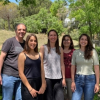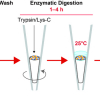
Bruker has announced a collaboration with Utrecht University to advance the study of the 3-D structures and interactions of proteins by mass spectrometry. The laboratory of Albert Heck at Utrecht University has been a leader in proteomics and the study of protein structure and interactions by mass spectrometry for over two decades. Richard Scheltema recently joined Utrecht University as group leader to focus on crosslinking mass spectrometry (XL-MS) for structural and interaction proteomics.
The collaborative work will focus on the development of the Trapped Ion Mobility Spectrometry (TIMS) and Parallel Accumulation Serial Fragmentation (PASEF) methods, along with crosslinkers and XL-MS software for the timsTOF Pro 4D-Proteomics mass spectrometer, in order to take advantage of its unique large-scale, accurate CCS workflows. These have been described in the paper “Benefits of Collisional Cross Section Assisted Precursor Selection (caps-PASEF) for Cross-linking Mass Spectrometry”, published in Molecular and Cellular Proteomics.
Bruker plans to commercialise the results of the collaboration as integrated solutions for the study of protein structures and interactions using XL-MS. Combining the novel, enrichable PhoX crosslinker (doi.org/d6m5), developed by Heck and Scheltema, with the speed and sensitivity of PASEF methods on the timsTOF Pro platform, enables the discovery of more crosslinked products which yield more information about protein structures and interactions. Advanced analysis software is key, as XL-MS data is more complex and even more information-rich than typical shot-gun proteomics experiments. Scheltema is working on enabling the innovative XlinkX software to process TIMS/PASEF data and making it available to the community of timsTOF Pro users.
Albert Heck of Utrecht University commented: “We are delighted to work with Bruker on the further development of workflows for XL-MS that take advantage of the speed of PASEF and the unique large-scale, accurate CCS data to enhance the detection of crosslinks in XL-MS. We are excited by the initial results published in Molecular and Cellular Proteomics and look forward to advancing XL-MS even further. We are also interested in other applications of ion mobility separation and CCS on the timsTOF Pro to glycoproteomics and top-down proteomics.”
Dr Gary Kruppa, the Vice President of Proteomics at Bruker, said: “Having personally been involved in some of the conceptual work in XL-MS in 2001 at Sandia National Laboratory, I believe the advances made by Heck’s group will make this technique more routinely available for structural biology studies using the timsTOF Pro. Our collaboration with Utrecht University will accelerate adoption of XL-MS within the broader structural and interaction proteomics community.”
Richard Scheltema of Utrecht University stated: “My group intends to push the boundaries of PASEF to enhance XL-MS workflows by making them CCS-aware. We have a significant ongoing effort in bioinformatics applied to analysing XL-MS data using our XlinkX software (doi.org/f72pgx). We are excited to work with the open data-format architecture of the timsTOF Pro in XlinkX to develop code that can use large-scale, accurate CCS values for the identification of crosslinks and to further improve false discovery rate (FDR) calculations.”
About the Heck-lab & Scheltema-lab at Utrecht University
The research groups of Albert Heck and Richard Scheltema are embedded in the Science Faculty of Utrecht University. A large emphasis of the group is on the development and applications of advanced mass spectrometry-based proteomics technologies. Complementary to the proteomics efforts, the group is also well-known for its expertise in mass spectrometry based structural biology, pioneering methods in native mass spectrometry and cross-linking mass spectrometry. The group coordinates the European Proteomics Research Infrastructure (EPIC-XS, epic-xs.eu) and heads the proteomics core in the Dutch X-Omics Initiative (www.x-omics.nl).




![Targeted proton transfer charge reduction (tPTCR) nano-DESI mass spectrometry imaging of liver tissue from orally dosed rat (Animal 3). a) optical image of a blood vessel within liver tissue. b) Composite ion image of charge-reduced haeme-bound α-globin (7+ and 6+ charge states; m/z 2259.9 and m/z 2636.3 respectively, red) and the charged-reduced [FABP+bezafibrate] complex (7+ and 6+ charge states; m/z 2097.5 and m/z 2446.9 respectively, blue). c) Ion image composed from charge-reduced haeme-bound α-globin (7+ and 6+ charge states) showing abundance in blood vessels. d) Ion image composed from charge-reduced [FABP+bezafibrate] complex (7+ and 6+ charge states) showing abundance in bulk tissue and absence in the blood vessel. Reproduced from https://doi.org/10.1002/ange.202202075 under a CC BY licence. Light and mass spectromert imaging of tissue samples](/sites/default/files/styles/thumbnail/public/news/MSI%20drug-protein%20complex-w.jpg?itok=CBNIjyYl)




